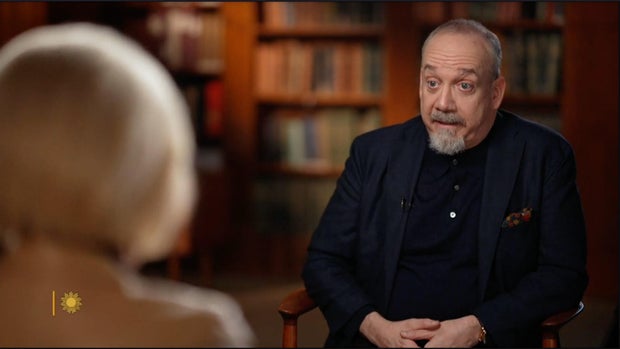Difficult characters are a Paul Giamatti specialty. He’s portrayed a cantankerous John Adams and a brutal U.S. Attorney in “Billions,” and, in his latest movie, “The Holdovers,” Giamatti plays Paul Hunham, a bitter teacher at a New England boarding school.
Hunham is in charge of the students with nowhere to go at Christmas, and he forms a bond with a rebellious kid and the school’s grieving cook, played by Da’Vine Joy Randolph, whose deceased son attended the school.
People have described the movie as a “Scrooge-like Christmas story,” with Giamatti being Scrooge. He thinks that’s apt.
“It has a ‘Christmas Carol’ thing,” Giamatti says. “I think all three of the characters are Scrooge a little bit. They all need to kind of move out of a place that they’re stuck in.”
The 56-year-old’s performance has earned him a nomination for best actor at the Oscars, and Critics Choice and Golden Globe awards. After his win at the Golden Globes, Giamatti says he took his award to a burger place before going out to parties and “fancy things.”
Giamatti’s role in “The Holdovers” was written for him.
CBS News
“There’s times when I think, ‘Why was this written specifically for me, a man who smells like fish that nobody likes?'” he says. “Then I look at it and go, ‘I think I know.'”
One reason: Giamatti, raised in Connecticut, attended a prep school himself.
“Most of it was pretty familiar to me,” he says of “The Holdovers.” “I had teachers like this guy. I think those schools are different now, but I had teachers that were the sort of strict, disciplinarians like this.”
He was not a troublemaker in school, although Giamatti admits he would cut classes to read in the library on his own. That bookishness ran in the family, as Giamatti’s mother, Toni, was a teacher, and his dad, Bart, was once president of Yale University and, later, Major League Baseball Commissioner.
Giamatti didn’t act professionally until after he’d graduated from college, although he “did it as an extracurricular thing” before then. He began his professional career in plays and, later, movies.
“I started making a very small living at it,” he says. “But I was deceived into thinking, ‘Oh, I can do this. This is not too bad.’ So, I think that’s when I went, ‘I should just do this. This is what I love to do.'”
Giamatti had one scene in his very first movie, a slasher called “Past Midnight,” which he says he’s never watched. After that, he quickly landed small roles opposite some big names in major films like “My Best Friend’s Wedding” and “Saving Private Ryan.”
He has a biopic to thank for his big break. It was about Howard Stern, and Giamatti played his put-upon corporate handler, Kenny “pig vomit” Rushton.
“It was a fantastic role,” says Giamatti. “It is an incredibly energetic and kind of crazy role with lots of latitude to do crazy things.”
Giamatti is known for playing curmudgeons, and he doesn’t mind his work being described that way.
“I often think that, really, I just play kind of complicated people. People with a complicated relationship to the world,” he says. One such character was Miles Raymond, the boozy failed writer and wine snob in the Academy Award-winning movie “Sideways.”
Outside of acting, Giamatti records a podcast called “Chinwag” and plays the theremin in his free time.
“I feel like every theremin player in the world is so insulted by what I do,” he says while recording “Chinwag” for an audience at the S.F. Sketchfest. Giamatti explains on “Sunday Morning” that his interest in “strange things” and “weird topics,” from UFOs to Big Foot and beyond, is why he does the podcast.
Looking back on all of the roles he’s played so far, one of Giamatti’s favorites was a part where he played no human at all. He played an orangutan, which, he says, “was really fun.”
“And so I was completely transformed, which, for an actor, is great,” he recalls. “I’d look in the mirror and I was gone.”‘
Giamatti says he cannot explain exactly why actors like himself may be drawn to “hiding” behind their roles.
“It’s a very strange way of connecting with other people. It’s very weird,” he says. “But I actually think it’s a good thing. I enjoy being weird. It’s OK to be weird. Weird is all right.”
Produced by Reid Orvedahl and Kay M. Lim. Edited by Carol A. Ross.

